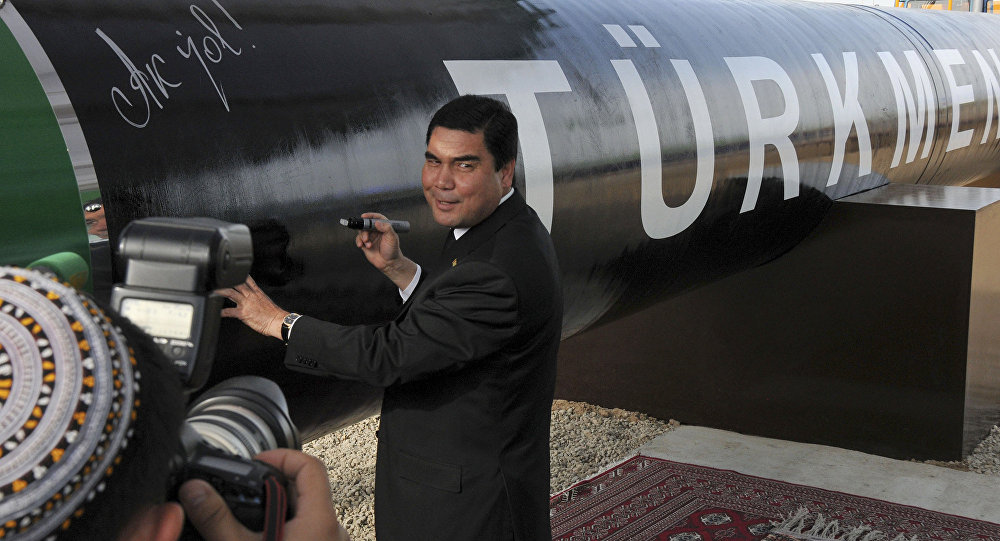Despite having the world’s fifth largest reserves of natural gas, Turkmenistan has never had much luck selling them Europe. But after the five Caspian Sea littoral states, which include Turkmenistan, agreed on the status of what is the world’s largest lake last year, that could soon change.
On Monday, U.S. President Donald Trump sent a holiday greeting to his Turkmenistani counterpart, Gurbanguly Berdimuhamedow, to mark the Novruz holiday celebrated in the Caspian region.
“I hope that Turkmenistan will be able to take advantage of new gas export opportunities to the West in connection with the recent determination of the legal status of the Caspian Sea,” Trump wrote according to reports by Turkmenistan’s Golden Century newspaper.
“The people of the United States of America and its businesses continue to look for new directions to strengthen our economic cooperation with Turkmenistan,” the letter continued.
A former Soviet republic of about 5.4 million people and a gross domestic product (GDP) of $38 billion, Turkmenistan today is Central Asia’s third-largest economy, behind Kazakhstan and Uzbekistan, according to U.S. government statistics. While agricultural exports comprise a sizeable portion of its economy, 25 percent of the country’s GDP is primarily derived from hydrocarbons, particularly natural gas – the bulk of which goes to China.
Turkmenistan has for long set its site on Europe in order to diversify its gas exports base, which would require a pipeline that passes underneath the waters of the Caspian. A Trans-Caspian underwater gas pipeline would begin in Turkmenistan and extend through the sea’s waters to Azerbaijan, passing through Georgia and Turkey, and further west to Europe.
The idea for such a feat of engineering was first announced in the United States in 1996. By 1999, General Electric and Bechtel agreed with Turkmenistan’s government to study the proposed pipeline route. Later that year Turkey, Georgia, Azerbaijan and Turkmenistan signed a series of agreements to make it happen. But the unresolved status of the Caspian Sea, a legacy of the breakup of the Soviet Union, dashed any hopes of launching the project off, or rather into, the ground.
In August 2018, during the fifth Caspian Summit in the Kazakhstani city of Aktau, the leaders of Azerbaijan, Iran, Kazakhstan, Russia and Turkmenistan finally signed an agreement on the status of the sea’s waters, after decades of disagreement and what seemed like never-ending negotiating, called the Convention on the Legal Status of the Caspian Sea.
Earlier this year the European Union offered Turkmenistan to join the Southern Gas Corridor project, which will supply Europe with 10 billion cubic meters (bcm) of natural gas per year and another six bcm to Turkey. Gas from Azerbaijan’s Shah Deniz field located beneath its portion of the Caspian Sea will for the first time reach Europe through the 3,500 kilometer (2,175 mile) corridor, starting in 2020.
Meanwhile, once the Trans-Caspian gas pipeline is launched, it will bypass energy-rich Russia, which has been at odds with Turkmenistan over gas prices.
Yevgeny Satanovsky, who heads the Institute of the Middle East, believes that the government in Ashgabat has not made things easy for itself to start exporting gas westward.
“The government is tough and selfish on all interested parties at the same time. By parties I mean the United States, Europe, and China. And the last thing it does is to keep in touch with Russia,” he said, according to reports by Nezavisimaya Gazeta.
“Gazprom is the eternal subject of [Turkmenistan’s] terrible suspicions of neocolonialism,” Satanovsky added, referring to Russia’s giant gas company.
State-owned Gazprom used to do business with Turkmenistan under a deal signed in 2009, but the company left the country after officials in Ashgabat refused to revise the terms of the contract and sell its resources to Russia at a renegotiated rate.
Gazprom’s CEO Alexei Miller visited Ashgabat on March 27 to meet with President Berdimuhamedow. In an interview with Turkmenistan’s “Vatan” TV channel, Miller said his company intends to resume the purchase of Turkmen gas in the near future.
"We see great prospects for expanding our cooperation in the gas sector,” Miller said following his meeting with Berdimuhamedow, according to reports by Interfax.
Currently, China is the only major importer of gas from Turkmenistan, making the Caspian country highly vulnerable to a single customer. The construction of a gas pipeline that links Turkmenistan and China through Uzbekistan and Kazakhstan was sponsored by Beijing, which binds the two countries together in what some analysts refer to as China’s ‘debt trap’. The terms of the agreement include the amount of money China has invested in the project, which is to be taken into account when deciding on a price point for the gas.







 Armenian sappers commenced on Monday mine-clearance operations in the territories adjacent to the Saint Mary Church in village of Voskepar (Armenia...
Armenian sappers commenced on Monday mine-clearance operations in the territories adjacent to the Saint Mary Church in village of Voskepar (Armenia...
 Iran and Pakistan have signed eight cooperation documents in various fields, and agreed to strengthen ties to fight terrorism in the region.
Iran and Pakistan have signed eight cooperation documents in various fields, and agreed to strengthen ties to fight terrorism in the region.
 President Aliyev emphasized the critical role of the North-South Transport Corridor in fostering transport cooperation between Azerbaijan and Russi...
President Aliyev emphasized the critical role of the North-South Transport Corridor in fostering transport cooperation between Azerbaijan and Russi...



